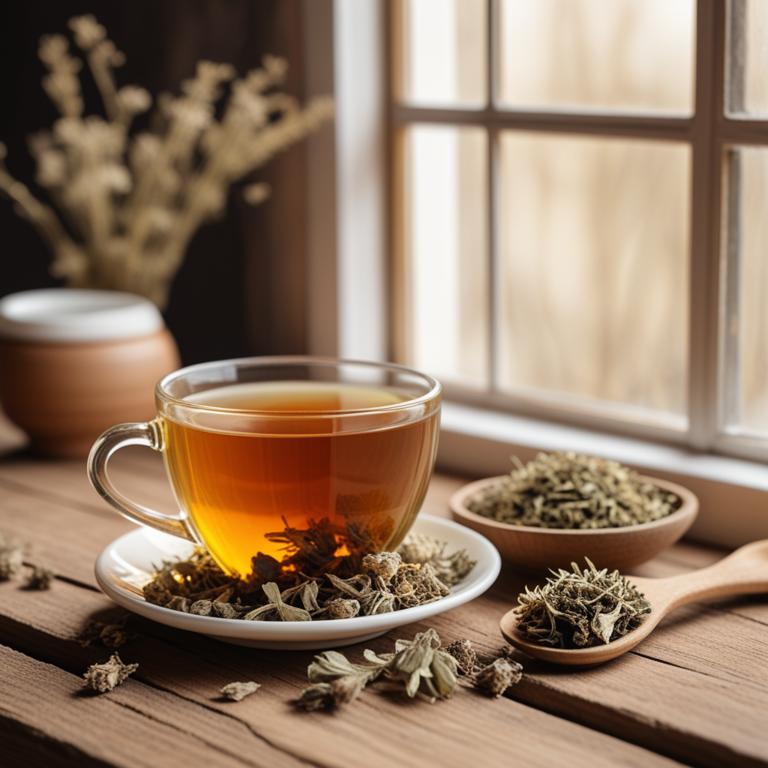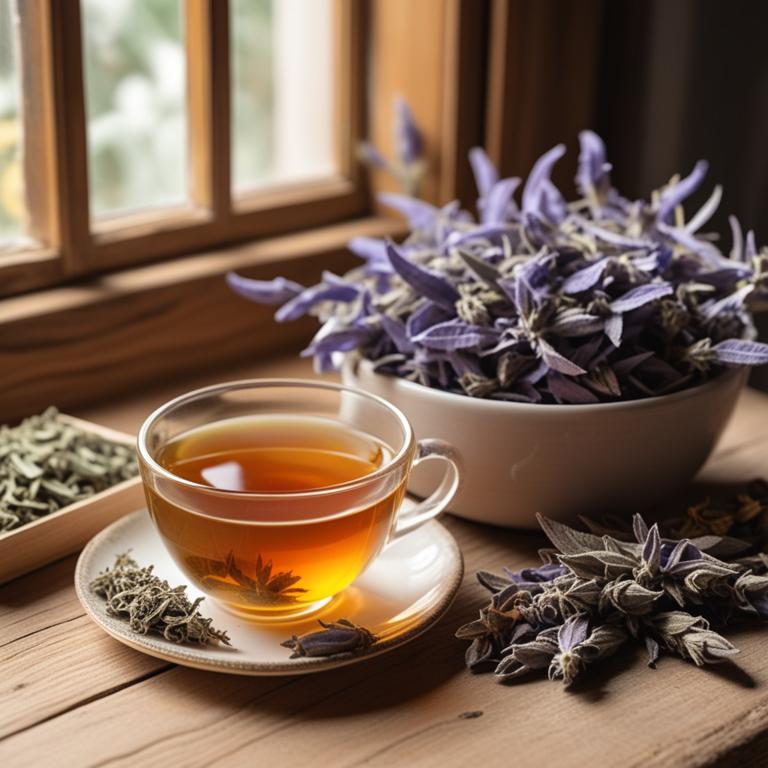13 Best Herbal Teas For Swollen Gums

Herbal teas for swollen gums are a natural remedy that involves drinking specific teas made from herbs to alleviate the symptoms of swollen gums, which is characterized by redness, inflammation, and pain in the gums.
These herbal teas offer numerous benefits, including reducing inflammation, fighting off infections, and providing relief from pain and discomfort.
Examples of herbal teas used to treat swollen gums include peppermint tea, which has antibacterial properties that help combat infections; chamomile tea, which has anti-inflammatory properties that soothe the gums; eucalyptus tea, which has decongestant properties that help reduce swelling; ginger tea, which has anti-inflammatory properties that reduce pain and inflammation; and calendula tea, which has antimicrobial properties that promote healing.
Additionally, other herbal teas such as sage tea, clove tea, and licorice root tea are also used to treat swollen gums due to their anti-inflammatory, antibacterial, and soothing properties that help reduce swelling and promote healing.
According to "Iranian journal of basic medical sciences", teas for swollen gums may be effective, specifically green tea, which has a large body of evidence supporting its effectiveness in reducing gingival inflammation and bleeding.
Below there's a list of the 13 best herbal teas for swollen gums.
- 1. Melissa officinalis teas
- 2. Eucalyptus globulus teas
- 3. Mentha x piperita teas
- 4. Echinacea purpurea teas
- 5. Salvia officinalis teas
- 6. Sambucus nigra teas
- 7. Thymus vulgaris teas
- 8. Rosmarinus officinalis teas
- 9. Lavandula angustifolia teas
- 10. Achillea millefolium teas
- 11. Urtica dioica teas
- 12. Foeniculum vulgare teas
- 13. Ginkgo biloba teas
Also you may be interested in...
TODAY'S FREE BOUNDLE
Herb Drying Checklist + Herbal Tea Shopping List + Medicinal Herbs Flashcards
Enter you best email address below to receive this bundle (3 product valued $19.95) for FREE + exclusive access to The Aphotecary Letter.
$19.95 -> $0.00
1. Melissa officinalis teas

Melissa officinalis teas, also known as lemon balm teas, have been traditionally used to treat swollen gums, a common symptom of gum inflammation.
The anti-inflammatory and antiseptic properties of Melissa officinalis teas help to reduce swelling and prevent infection, making it an effective remedy for this ailment.
The bioactive constituents, such as rosmarinic acid and citral, present in Melissa officinalis teas, have been shown to exhibit antimicrobial and anti-inflammatory activities, which contribute to its therapeutic effects.
The benefits of using Melissa officinalis teas to treat swollen gums include reduced inflammation, prevention of infection, and promotion of overall oral health.
2. Eucalyptus globulus teas

Eucalyptus globulus teas have been traditionally used to treat swollen gums, a common condition characterized by inflammation and pain in the gums.
The anti-inflammatory and antimicrobial properties of this herbal preparation help to treat swollen gums by reducing inflammation, preventing infection, and promoting healing.
The bioactive constituents of Eucalyptus globulus, including eucalyptol, flavonoids, and phenolic acids, contribute to its therapeutic effects by exhibiting antioxidant, anti-inflammatory, and antibacterial activities.
Regular consumption of Eucalyptus globulus teas can provide relief from swollen gums by reducing symptoms, preventing complications, and promoting overall oral health.
3. Mentha x piperita teas

Mentha x piperita teas, also known as peppermint tea, have been traditionally used to treat swollen gums due to their anti-inflammatory and antimicrobial properties.
The bioactive constituents, including menthol and menthone, help to reduce inflammation and alleviate pain by acting as analgesics and local anesthetics, thus providing relief from swollen gums.
The tea's cooling effect also helps to numb the area and reduce swelling, making it an effective remedy for this common ailment.
Additionally, peppermint tea's ability to reduce bacterial growth and fight off infections further contributes to its benefits in treating swollen gums, making it a popular natural remedy among those seeking a holistic approach to oral health.
Related Study
According to "Avicenna journal of phytomedicine", Mentha x piperita teas may be effective for swollen gums due to its antibacterial properties, which can inhibit the formation of oral bacteria biofilm and decompose existing biofilms.
4. Echinacea purpurea teas

Echinacea purpurea teas have been used traditionally to treat swollen gums, a common symptom of gum inflammation and infection.
The anti-inflammatory properties of this herbal preparation help to reduce swelling and alleviate pain by inhibiting the production of pro-inflammatory cytokines.
The bioactive constituents of Echinacea purpurea teas, including alkylamides, glycosides, and phenolic acids, contribute to its anti-inflammatory and antimicrobial effects, which aid in the treatment of swollen gums.
Regular consumption of Echinacea purpurea teas can help to reduce the severity and duration of swollen gums, promoting a faster recovery and reducing the risk of complications.
5. Salvia officinalis teas

Salvia officinalis teas, a traditional herbal remedy, have been used for centuries to treat swollen gums, a common ailment caused by inflammation and infection.
The antimicrobial properties of Salvia officinalis teas, particularly its high content of essential oils such as thujone and camphor, help to combat bacterial growth and reduce inflammation in the gums.
The bioactive constituents of Salvia officinalis teas, including flavonoids and phenolic acids, also possess anti-inflammatory and antioxidant properties that help to soothe and calm the swollen gums, promoting healing and reducing pain.
By incorporating Salvia officinalis teas into one's oral care routine, individuals can benefit from its natural antimicrobial and anti-inflammatory properties, reducing the risk of further complications and promoting overall oral health.
Related Study
According to "Journal of cancer research and clinical oncology", Salvia officinalis teas for swollen gums are recommended due to good evidence suggesting they alleviate symptoms of oral mucositis and gingivitis.
6. Sambucus nigra teas

Sambucus nigra teas, derived from the elderberry plant, have been traditionally used to treat swollen gums, a common symptom of gingivitis and periodontal disease.
The anti-inflammatory and antimicrobial properties of this herbal preparation help to reduce swelling, fight bacterial infections, and promote healing.
The bioactive constituents, including flavonoids, phenolic acids, and anthocyanins, contribute to the therapeutic effects of Sambucus nigra teas by reducing inflammation, preventing tissue damage, and promoting collagen synthesis.
By consuming Sambucus nigra teas, individuals can benefit from reduced swelling, pain, and bleeding, as well as improved gum health and overall oral well-being.
7. Thymus vulgaris teas

Thymus vulgaris teas, also known as thyme tea, have been traditionally used to treat swollen gums, a common symptom of gum inflammation and infections.
The anti-inflammatory and antimicrobial properties of thyme tea help to reduce swelling and combat the underlying bacterial or fungal infections causing the condition.
Thyme tea contains bioactive constituents such as thymol and carvacrol, which possess potent antibacterial and antifungal properties that help to inhibit the growth of pathogens and promote healing.
By drinking thyme tea regularly, individuals can benefit from its anti-inflammatory effects, antimicrobial properties, and ability to promote oral health, making it a natural and effective remedy for swollen gums.
Related Study
According to the study on "Complementary therapies in medicine", Thymus vulgaris teas, which are part of the sage tea-thyme-peppermint hydrosol, showed promising results in alleviating oral mucositis, including swollen gums, particularly in patients undergoing chemotherapy.
8. Rosmarinus officinalis teas

Rosmarinus officinalis teas have been used to treat swollen gums due to their anti-inflammatory and antimicrobial properties, which help to reduce swelling and combat bacterial infections.
The herbal preparation's ability to inhibit the growth of bacteria and fungi contributes to its effectiveness in treating this ailment.
The bioactive constituents, including carnosic acid, rosmarinic acid, and camphor, work together to reduce inflammation and promote healing in the affected area.
Regular consumption of Rosmarinus officinalis teas has been shown to provide relief from swollen gums, promoting oral health and well-being.
Related Study
According to "PloS one", Rosmarinus officinalis teas for swollen gums may be effective due to the herb's extracts showing moderate to high antibiofilm activity comparable to that of chlorhexidine against Streptococcus mutans, a common cause of oral infections.
9. Lavandula angustifolia teas

Lavandula angustifolia teas have been traditionally used to treat swollen gums due to their anti-inflammatory and antimicrobial properties, which help to reduce swelling and combat bacterial infections.
The bioactive constituents of lavender, including linalool and linalyl acetate, exhibit a synergistic effect in reducing inflammation and promoting wound healing, thus effectively addressing the symptoms of swollen gums.
This herbal preparation helps to treat swollen gums by reducing pain, inflammation, and swelling, ultimately promoting a speedy recovery.
The benefits of using Lavandula angustifolia teas to treat swollen gums include its natural and non-invasive nature, making it a popular choice among individuals seeking alternative remedies for this ailment.
10. Achillea millefolium teas

Achillea millefolium teas have been traditionally used to treat swollen gums, a common ailment characterized by inflammation and pain.
The anti-inflammatory properties of this herbal preparation, which are attributed to the presence of bioactive constituents such as flavonoids, sesquiterpenes, and phenolic acids, help to reduce swelling and alleviate pain.
By reducing inflammation and promoting healing, Achillea millefolium teas can help to treat swollen gums, making it a beneficial remedy for those suffering from this condition.
The benefits of using Achillea millefolium teas to treat swollen gums include reduced inflammation, pain relief, and improved oral health, making it a natural and effective solution for this common problem.
11. Urtica dioica teas

Urtica dioica teas, derived from the leaves of the stinging nettle plant, have been traditionally used to treat swollen gums due to their anti-inflammatory and antioxidant properties.
The bioactive constituents, including flavonoids, saponins, and alkaloids, help to reduce inflammation and swelling by inhibiting the production of pro-inflammatory enzymes and cytokines.
By reducing inflammation and promoting healing, Urtica dioica teas can help to alleviate symptoms of swollen gums, such as pain, redness, and swelling.
The benefits of using Urtica dioica teas for this ailment include natural and non-invasive treatment, reduced risk of side effects, and potential long-term improvement in gum health.
12. Foeniculum vulgare teas

Foeniculum vulgare teas, also known as fennel teas, have been traditionally used to treat swollen gums due to its anti-inflammatory and antimicrobial properties.
The herbal preparation helps to reduce swelling and ease pain by promoting blood circulation and reducing bacterial growth, thereby alleviating the discomfort associated with swollen gums.
The bioactive constituents, including anethole, fenchone, and limonene, present in fennel teas, contribute to its therapeutic effects by inhibiting the growth of bacteria and reducing inflammation.
The benefits of using fennel teas to treat swollen gums include its safety, efficacy, and accessibility, making it a popular natural remedy for this common oral health issue.
13. Ginkgo biloba teas

Ginkgo biloba teas have been used traditionally to treat swollen gums, also known as gingivitis, due to their anti-inflammatory and antioxidant properties.
The flavonoids and terpenoids present in this herbal preparation help to reduce inflammation and prevent the formation of plaque, which contributes to gum swelling.
The bioactive constituents of Ginkgo biloba, such as quercetin and bilobalide, have been shown to have antimicrobial properties, which can help to control the growth of bacteria that cause gum infection.
The benefits of using Ginkgo biloba teas to treat swollen gums include reduced inflammation, improved gum health, and a lower risk of gum disease progression.